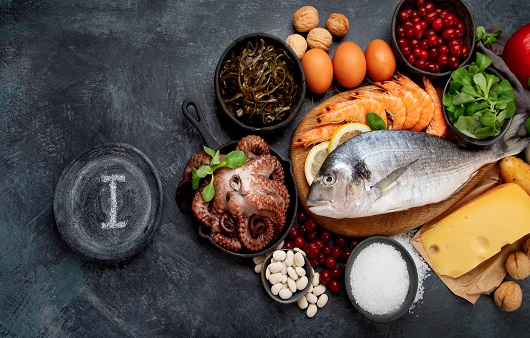The thyroid is a butterfly-shaped endocrine gland that surrounds the lower cartilage of the uvula on the left and right and secretes thyroid hormones. Thyroid hormone plays an important role in maintaining body temperature and maintaining the balance of body metabolism. When the thyroid gland secretes more of this hormone than necessary, it is called hyperthyroidism, and when it secretes less than necessary, it is called hypothyroidism. The following is a diet that patients with each disease should follow.
ThyroidㅣSource: Getty Image Bank
hyperthyroidism
Hyperthyroidism means that the body’s metabolism speeds up due to excessive secretion of thyroid hormone. There might be differences depending on the severity of the disease and the individual, but the typical symptoms are as follows.
1. The food tastes great, but I’m losing weight (I’ve lost more than 5kg in the last few months)
2. Your pulse exceeds 90 beats per minute even when you’re at rest
3. I can’t stand the heat any more than others and I sweat a lot
4. Your hands are shaking lately
5. There was a time when I was paralyzed and couldn’t move, but I was sober at the time.
In the case of patients with hyperthyroidism, weight loss and muscle loss occur due to increased metabolism, so you need to consume enough calories and protein. Even if your appetite decreases, you must make an effort to consistently provide nutrients by eating small amounts of frequent meals or snacks. It is also a good way to consume nutritious drinks when the amount of food is small. Excessive sweating and diarrhea can cause dehydration. Therefore, it is recommended to drink 3-4 liters of water a day.
Patients with long-term antihypertensive disease will most likely suffer from osteoporosis. This is because excessive thyroid hormone secretion leads to significant bone resorption and a decrease in bone density. In this period it is good to consume dairy products such as cheese and milk, rich in protein, vitamin D and calcium.
It is best to avoid foods that are high in fat and difficult to digest. Also, if your blood sugar is not controlled, limit your intake of simple sugars. There are no special foods to avoid, but avoid excessive iodine intake, which is abundant in seaweed and shellfish. Because iodine is a source of thyroid hormones. In particular, in the case of treatment with radioactive iodine, a low-iodine diet strictly limiting iodine intake should be implemented 2 weeks before the start of treatment.
 IodineㅣSource: Getty Image Bank
IodineㅣSource: Getty Image Bank
hypothyroidism
Hypothyroidism means that the body’s metabolism is not regular due to a lack of thyroid hormone. Typical symptoms of hypothyroidism include:
1. Easily fatigued and lethargic
2. You are colder than others
3. I have no appetite, but I continue to gain weight (I have gained more than 5 kg in the last few months)
4. Your neck has been popping out a lot lately
In the case of patients with hypothyroidism, symptoms such as weight gain, constipation, increased blood cholesterol and iron deficiency anemia may be accompanied by a decrease in metabolism. Gastrointestinal motility is reduced, making it easy to cause constipation, so you should consume enough water along with fiber-rich meals such as vegetables, fruits, seaweeds, and whole grains. If iron deficiency anemia appears, iron-rich foods, such as liver, oysters, fish, meat, and egg yolks, are helpful. However, most of these foods are also high in cholesterol. Patients with hypothyroidism can easily raise blood cholesterol levels, so it is recommended to limit these foods to about once a week and supplement the iron components with nutrients.
As mentioned above, iodine is a raw material for thyroid hormones. Hypothyroidism is caused by a lack of thyroid hormone, so it’s good to get enough iodine. However, it’s not good to consume more iodine than you need. Rather, excessive iodine intake can reduce the production and secretion of hormones by the thyroid gland. The recommended daily intake of iodine for adults is 150 µg.
If you are on thyroid hormone medication, you should be careful of your gluten intake. Gluten affects the small intestine and interferes with the absorption of drugs in the body.
<저작권©언론사 하이닥, 무단 전재 및 재배포 금지>

